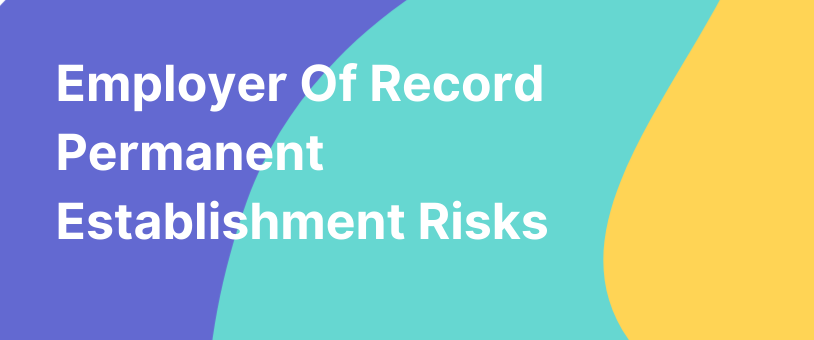Permanent establishments (PEs) and how it impacts tax obligations
A permanent establishment (PE) is a fixed place of business through which a company carries on its business activities. If a company has a PE in a foreign country, it may be subject to tax on its income and profits generated through the PE. This is because the foreign country may consider the company to be carrying on business within its borders and therefore subject to its tax laws.
What is considered a permanent establishment?
There are several factors that can create a PE, including:
- Having a physical office, factory, or branch in a foreign country.
- Having employees working in a foreign country.
- Carrying out business activities through agents or other intermediaries in the foreign country.
PE risks when using an employer of record
Using an employer of record (EOR) to engage employees in a foreign country can create risks related to the potential creation of a PE. An EOR is a company that hires employees on behalf of another company and is responsible for paying their wages and benefits, as well as complying with local employment laws.
An EOR will have a legal entity in the country you hire from. This allows you to avoid PE risks if you’re only hiring a few workers from each location and/or your hires stay with the company for under 2 years.
Courts can still deem you as the actual employer
The most prominent risk of using an EOR is the fact that your company can be deemed the actual employer of employees in court. This can occur if the EOR is considered to be acting as an agent for the company or if the employees hired through the EOR are deemed to be working for the company rather than the EOR in a court case. If you are deemed the actual employer, you become subject to the taxes and costs associated with having a PE in that country. You can also be subject to double taxation.
More employees in one country = more PE risk
If you’re hiring several employees in a country or they have worked for you for more than a year, you run the risk of being deemed the actual employer and facing costs associated with not having a permanent establishment in the country you hired from.
Most countries don’t set a maximum number for EOR workers, but there are rules of thumb. “If you have one or two employees for six to 12 months, subject to the activities of the individuals, you should generally be fine. By the time you have six employees for two or three years, however, your ability to argue you don’t have a PE is going to be difficult,”.
Tom LickessGlobal Head of International Tax Advisory – Vistra
There is no rule of thumb for how many employees you can have in one location and how long they can work for you. Every country has different regulations around this subject. It’s important to be aware that the more people you hire, and the longer those hires work for your company, you become increasingly at risk if you don’t have a permanent establishment.
The type of work your remote employees are doing can increase PE risk
Even if your company does not have a physical presence in the country, you can still be considered to have a PE in a foreign country. For example, if your company regularly carries out business in a foreign country through your website or through the use of independent contractors, you may be considered to have a PE in the foreign country.
The determination of whether a company has a PE in a foreign country is typically made on a case-by-case basis, taking into account the specific facts and circumstances of the company’s business activities in the foreign country.
“Perhaps a US company with a small UK-based sales team doesn’t believe it has a taxable presence in the UK, so it pays US taxes on its earnings attributable to for example UK or European customers,” Lickess says. “If the UK tax authority determines that the UK-based team constitutes a taxable presence or permanent establishment of the US company, then UK corporate tax may well be levied on this same income that has been subject to US tax.” Penalties and interest may also apply.
Tom LickessGlobal Head of International Tax Advisory – Vistra
There is no specific list of roles or positions that automatically require a permanent establishment (PE) in a foreign country. Rather, the presence of a PE is determined based on the nature and extent of a company’s business activities in a foreign country.
Tips for minimizing PE risks when using an EOR
Use a reputable EOR
Choose an EOR that has a track record of compliance with local employment laws and a strong reputation in the country where the employees will be working. This can help reduce the risk of the EOR being considered an agent of the company, which could create a PE.
Establish a clear written agreement
Have a clear written agreement in place between the company and the EOR outlining the EOR’s responsibilities and the company’s lack of control over the EOR’s activities. This can help demonstrate that the EOR is acting as an independent contractor rather than as an agent of the company.
Ensure that the employees are considered to be working for the EOR
Make sure that the employment relationship between the EOR and the employees is clear and that the employees are considered to be working for the EOR rather than the company. This can be achieved through the use of appropriate documentation and by ensuring that the EOR has reasonable control over the employees’ work and decisions related to their employment.
Limit the scope of the EOR’s activities
To minimize the risk of the EOR being considered an agent of the company, consider limiting the scope of the EOR’s activities to those that are necessary for the proper functioning of the company’s business in the foreign country. Avoid giving the EOR broad authority to act on behalf of the company in a foreign country.
Review the PE risks regularly
PE laws and regulations can change over time, so it is important to regularly review your company’s business activities in a foreign country and assess whether they could potentially create a PE. If the risk of a PE is identified, consider taking steps to mitigate the risk, such as by modifying the company’s business activities or the relationship with the EOR.
When to switch to a PE when using an EOR
Using an EOR to hire employees in a foreign country can be a convenient way for a company to comply with local employment laws and avoid the costs and complexities of setting up a permanent establishment. However, there are certain circumstances in which it may be advisable for a company to switch from using an EOR to a PE.
Significant business activity
One reason your company may want to switch to a permanent establishment is if you plan to carry out significant business activities in a foreign country over an extended period of time. In this case, the costs and benefits of establishing a PE may outweigh those of using an EOR.
EOR acting as an agent of your company
Another reason you may want to switch to a PE is if you are at risk of creating a PE through the use of your EOR. If the EOR is considered to be acting as an agent of the company or if the employees hired through the EOR are considered to be working for the company rather than the EOR, your company may be at risk of being taxed as if it had a PE in the foreign country. In this case, establishing a PE may be a more appropriate way for the company to conduct its business activities in a foreign country.
Consider the costs and benefits of switching
Before switching from an EOR to a PE, it is important for the company to carefully consider the costs and benefits of each approach and to consult with legal and tax advisors to ensure that it is making the best decision for your business.
Talk to your EOR about PE risk regularly
Properly managing the relationship with your EOR and understanding the potential PE risks can help your company avoid unintended tax liabilities and ensure compliance with local laws in the foreign country.
Consider having a quarterly check-in, where you determine what your risk level is for being determined a permanent establishment.
Do you still need an EOR if you switch to a permanent establishment?
It is generally not necessary to use an employer of record (EOR) if a company has established a permanent establishment (PE) in a foreign country. However, an employer of record can still be valuable for outsourcing payroll, taxes, benefits, and compliance while you’re setting up your permanent establishment.
Many EORs also have HR platforms you can use to make hiring and managing remote employees much easier.
If you set up a permanent establishment in a country, you can also consider other solutions like a professional employer organization, or outsourced HR agency.
Our recommended EORs
Remote is a robust and modern platform for remote-first teams. EOR, contractor management, payroll, benefits, and more.
Oyster is an intuitive platform that allows you to hire, pay, and care for a global team in more than 180 countries. EOR, contractor management, payroll, benefits, and more.
TFY has features for applicant tracking, freelance management, payroll, and more in a single platform. The platform supports diversity hiring and Corporate Social Responsibility (CSR) initiatives.
Lano is both a B2B & B2C platform. Businesses can use it to process global payroll, hire remote talent and manage contractors, while employees and freelancers can benefit from its payslip service, invoicing app, multi-currency wallet, and more.





